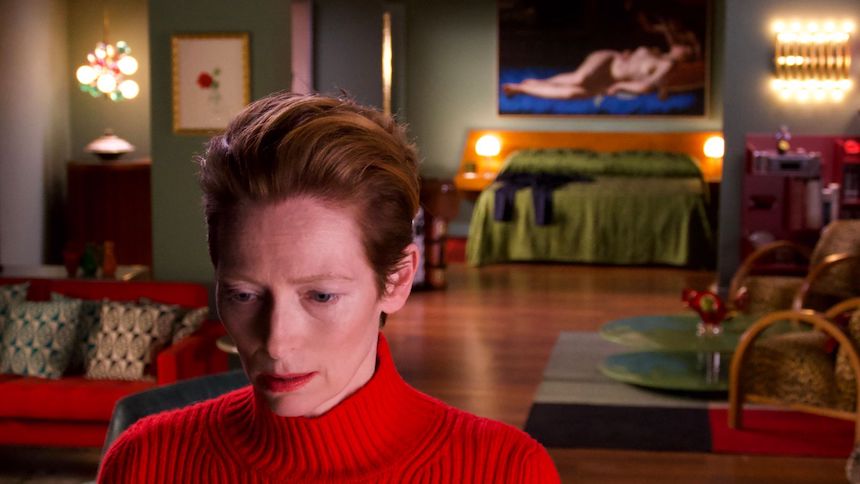New York 2020 Review: THE HUMAN VOICE, Quintessential Almodovar, Plus Tilda Swinton in Short Form

Conceived as a short project during Covid lockdown, Pedro Almodovar's The Human Voice, based on Jean Cocteau's stage play, with its popping colors and its melodramatic theme, is a quintessential Almodovar film. It is also a great reflection on filmmaking in the face of a worldwide pandemic. And it's all Tilda.
In his first English-language film, Almodovar puts his full trust in Tilda Swinton, who, over the years, has become a larger than life international movie icon, to carry the whole 30 minutes alone carrying on an imaginary conversation with herself.
It starts with Swinton in various haute couture clothing walking around in what appears to be a big sound stage. The title sequence is made up of beautiful renderings of various tools, foreshadowing what's to come.
Tilda is in her apartment, a bright colored, stylish multi room apartment that is the typical set-up for all of Almodovar's domestic melodramas. What is different this time is that we can see that these rooms are sets in the sound stage the film starts in. It reminds that everything we've seen in his films previously, however lived-in those rooms seemed, were elaborate sets, designed by Antxón Gómez, Almodovar's long time set designer, in the movie stages. It also reminds that his melodramas make you invest in his films to the degree that you suspend your belief that you are watching make-believe, that is, cinema.
It doesn't really matter, because as soon as Swinton engages us in her tumultuous breakup story with her lover of four years, we are hooked once again, suspending our belief and being absorbed into the melodrama of her life.
Swinton takes a quick trip to, of all places, a hardware store. She buys a large axe and puts it in her Gucci bag. When she gets home/stage, she tries to axe the man's black suit that is laid on her bed. Her border collie barks at all the violence. She shouts at the dog to shut up.
She goes to a living room and picks up a ceramic tea set, which is obviously a movie set decoration and throws it out the balcony/stage floor. She then proceeds to take colorful pills and passes out on the bed. Then her phone rings.
It's presumably her lover who she just broke up with three days ago. She carries on a long-winded conversation with him, cooing, pleading and yelling and apologizing into her air pod. It's a familiar scene of love and heartbreak. They had four years of a passionate, intoxicating relationship and now it's all over. They didn't even get to say a proper good-bye and she doesn't want to do that over the phone. But he is not even going to stop by to pick up his stuff.
As film productions around the world slowly pick up again with limited crew and strict restrictions (daily testing for cast and crew, limited numbers on the set and in premises), this one-person show reflects the state of the film industry today very accurately. The Human Voice, in true Almodovar fashion, ends in satisfying conclusion: in flames, where the stage, the make-believe literally burns down. Hopefully, this isn't the first and last collaboration between Almodovar and Swinton, because this short film is an extremely enjoyable experience.
Dustin Chang is a freelance writer. His musings and opinions on everything cinema and beyond can be found at www.dustinchang.com







